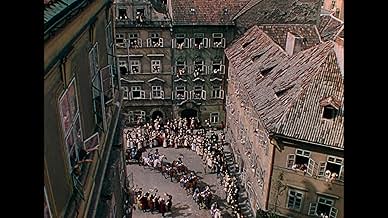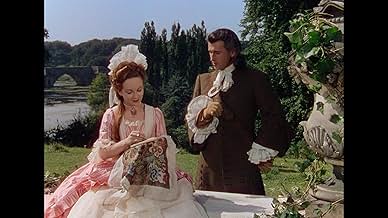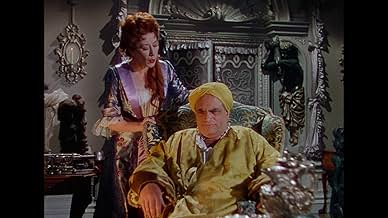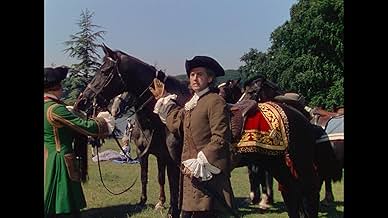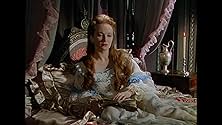AVALIAÇÃO DA IMDb
6,5/10
711
SUA AVALIAÇÃO
Adicionar um enredo no seu idiomaYoung Sophie Dorothea marries Prince George Louis but it's far from a love match. Then she falls for Swedish Count Philip Christoph von Königsmark.Young Sophie Dorothea marries Prince George Louis but it's far from a love match. Then she falls for Swedish Count Philip Christoph von Königsmark.Young Sophie Dorothea marries Prince George Louis but it's far from a love match. Then she falls for Swedish Count Philip Christoph von Königsmark.
- Direção
- Roteiristas
- Artistas
- Indicado a 1 Oscar
- 1 vitória e 2 indicações no total
Françoise Rosay
- The Electress Sophia
- (as Francoise Rosay)
Avaliações em destaque
This film is about a scandal that almost changed history. Unless you study geneology, you probably are unaware of the exact line of descent of the present Royal Family of England. Most people don't really think about it but the House of Windsor has only had that name since 1917 (when it's German name was changed in World War I). It was known (from 1901 - 1917) as the House of Saxe - Coburg Gotha, because Edward VII's father (Prince Albert - Queen Victoria's husband) was the Prince of Saxe - Coburg Gotha. Prior to 1901 (when Edward VII inherited the British throne) the Royal Family was known as the House of Hanover. The Hanovarians ruled England from 1714 - 1901 through six monarchs. But prior to 1714, the Royal Family were the Scottish based Stuarts (who ruled, with one eleven year gap, from 1603 - 1714). It's confusing, but much political turmoil is involved in the change from Stuarts to Hanovarians.
The Stuarts were cousins of the Tudors, and when the great Elizabeth I died in 1603 she was without Tudor heirs. James VI of Scotland (son of Elizabeth's rival and cousin, Mary, Queen of Scots) became James I of England. James I had two sons and one daughter. The daughter, Elizabeth, married a German Protestant prince, the Elector of the Palatinate (now part of the Czech Republic). Her descendants included Prince Rupert, the brilliant cavalry general for his uncle King Charles I in the Civil Wars of the 1640s. One of the descendants of Elizabeth Stuart was Princess Sophia, the wife of the Elector of Hanover. In the 1690s, the elderly Princess found that (except for Princess Anne of England, and her son William, Duke of Gloucester - a sickly youth who would die in 1701) she was next in line to the British throne if anything happened to King William III and his wife Queen Mary II. If anything happened to Princess Sophia, her son Prince George inherited her claim to the British throne. Sorry for this confusion of inherited titles presumptive, but that is how it went.
Prince George was not a loveable person. He was a demanding bully. He had married a cousin named Sophia Dorothea of Celle for her inheritance (needed to beef up his German territories around Hanover). George's father (the Elector of Hanover) had a mistress, Countess von Platen, who wielded great influence in the German state. This Countess introduced a young Swedish aristocrat, Count Philippe Koeningsmarck, to the court. She liked the Swedish Count, who was a military expert. Actually she more than liked him - she adored him. While Koeningsmarck was grateful, he did hold her at arms length. This would prove a mistake.
His second mistake was that he and Princess Sophia Dorothea of Celle met and became too chummy. Letters and diaries of the Princess survive, and suggest a platonic relationship, but it might have been closer. It angered the Countess, who felt her friendship was slighted. It angered Prince George, who (while he had many mistresses) did not like the snickers of people thinking him a cuckold. One day Koeningsmarck was called to the royal palace. He was never seen again, although many years later a skeleton of a man was found buried in an obscure corner there. Platen (most likely) decoyed the Swede, and had him assassinated - she found her influence in court dead after that, and in her last years was thought to be plagued by Koeningsmarck's ghost. In European circles the scandal spread, especially as it affected the way Englishmen viewed the prospected Protestant heirs to the throne. Had the choice of Hanovarians been needed to be made in 1695 - 1701, chances are George and his mother would have been by-passed. But the War of the Spanish Succession began in 1701, and lasted through the reigh of Queen Anne (the last Stuart). Her half-brother, James the Old Pretender (father of Bonnie Prince Charlie)was a Catholic who supported his cousin Louis XIV in the war. Prince George, despite the scandal, became King George I in 1714. And his descendants have ruled Britain ever since.
Poor Princess Sophia Dorothea of Celle never was Queen. George did not divorce her, but he had her imprisoned in her castle at Celle until she died in 1726. Her son and daughter by George never forgave him, and the boy (the future King George II) made life very difficult for his father as a result. George I died in 1727. There is a story (which one would like to believe) that while visiting Hanover shortly after his wife's death, a note was thrown into his carriage from a crowd. The note was from Sophia Dorothea, and it cursed George for his bullying and cruelty to her and others. George, reportedly, had a seizure reading this vitriolic message from the dead, and was paralyzed as a result until he died. Unfortunately this story seems to be false.
The film is pretty close to the actual tale, though it makes the relationship between the Princess of Celle and Koeningsmarck seem more of a love affair than it may have been. Stewart Granger is fine as the Swedish Count, and Joan Greenwood (she of the plummy toned voice) is equally good as the Princess. Peter Bull, that splendid British heavy, does a good Prince George, bullying his wife and servants, but capable of sly viciousness when he wants to retaliate against Koeningsmarck. And Flora Robson shows the inner demons driving her to destroy the young protegee who can't reciprocate a love he never had in the first place. Anthony Quayle, as one of the rivals of Koeningsmarck at the little royal court, is as good as he usually is, and lives up to the warning of never turning your back on Quayle in a duel!
Oddly enough, the Koeningsmarck family left a larger shadow on European history than this film suggests. At one point in the script, Philippe mentions that his younger brother (Count Karl von Koeningsmarck) was tried for murder. It is true, and has so far escaped a motion picture treatment. In 1681, Lady Elizabeth Ogle was the richest heiress in England, and was being romanced by Koeningsmarck and by Thomas Thynn of Longleat, who was the richest commoner in England. Karl von Koeningsmarck had three thugs attack and kill Thynn in his coach in London. The three thugs were found guilty of the murder and executed, but the Count (due to influence from King Charles II) was acqitted. However, Count Karl died a few years afterwards. He and Phillipe had a sister Elizabeth, who had an affair with Augustus the Strong, Elector of Saxony and elected King of Poland. Their illegitimate son was Maurice, Marachel de Saxe of France, the leading European general from 1722 - 1750. Marachel Saxe was known to be particularly rough in leading his men against armies led by members of the Hanovarian royal family in the wars of this period. Apparently he was trying to even the score for poor Uncle Philippe!
The Stuarts were cousins of the Tudors, and when the great Elizabeth I died in 1603 she was without Tudor heirs. James VI of Scotland (son of Elizabeth's rival and cousin, Mary, Queen of Scots) became James I of England. James I had two sons and one daughter. The daughter, Elizabeth, married a German Protestant prince, the Elector of the Palatinate (now part of the Czech Republic). Her descendants included Prince Rupert, the brilliant cavalry general for his uncle King Charles I in the Civil Wars of the 1640s. One of the descendants of Elizabeth Stuart was Princess Sophia, the wife of the Elector of Hanover. In the 1690s, the elderly Princess found that (except for Princess Anne of England, and her son William, Duke of Gloucester - a sickly youth who would die in 1701) she was next in line to the British throne if anything happened to King William III and his wife Queen Mary II. If anything happened to Princess Sophia, her son Prince George inherited her claim to the British throne. Sorry for this confusion of inherited titles presumptive, but that is how it went.
Prince George was not a loveable person. He was a demanding bully. He had married a cousin named Sophia Dorothea of Celle for her inheritance (needed to beef up his German territories around Hanover). George's father (the Elector of Hanover) had a mistress, Countess von Platen, who wielded great influence in the German state. This Countess introduced a young Swedish aristocrat, Count Philippe Koeningsmarck, to the court. She liked the Swedish Count, who was a military expert. Actually she more than liked him - she adored him. While Koeningsmarck was grateful, he did hold her at arms length. This would prove a mistake.
His second mistake was that he and Princess Sophia Dorothea of Celle met and became too chummy. Letters and diaries of the Princess survive, and suggest a platonic relationship, but it might have been closer. It angered the Countess, who felt her friendship was slighted. It angered Prince George, who (while he had many mistresses) did not like the snickers of people thinking him a cuckold. One day Koeningsmarck was called to the royal palace. He was never seen again, although many years later a skeleton of a man was found buried in an obscure corner there. Platen (most likely) decoyed the Swede, and had him assassinated - she found her influence in court dead after that, and in her last years was thought to be plagued by Koeningsmarck's ghost. In European circles the scandal spread, especially as it affected the way Englishmen viewed the prospected Protestant heirs to the throne. Had the choice of Hanovarians been needed to be made in 1695 - 1701, chances are George and his mother would have been by-passed. But the War of the Spanish Succession began in 1701, and lasted through the reigh of Queen Anne (the last Stuart). Her half-brother, James the Old Pretender (father of Bonnie Prince Charlie)was a Catholic who supported his cousin Louis XIV in the war. Prince George, despite the scandal, became King George I in 1714. And his descendants have ruled Britain ever since.
Poor Princess Sophia Dorothea of Celle never was Queen. George did not divorce her, but he had her imprisoned in her castle at Celle until she died in 1726. Her son and daughter by George never forgave him, and the boy (the future King George II) made life very difficult for his father as a result. George I died in 1727. There is a story (which one would like to believe) that while visiting Hanover shortly after his wife's death, a note was thrown into his carriage from a crowd. The note was from Sophia Dorothea, and it cursed George for his bullying and cruelty to her and others. George, reportedly, had a seizure reading this vitriolic message from the dead, and was paralyzed as a result until he died. Unfortunately this story seems to be false.
The film is pretty close to the actual tale, though it makes the relationship between the Princess of Celle and Koeningsmarck seem more of a love affair than it may have been. Stewart Granger is fine as the Swedish Count, and Joan Greenwood (she of the plummy toned voice) is equally good as the Princess. Peter Bull, that splendid British heavy, does a good Prince George, bullying his wife and servants, but capable of sly viciousness when he wants to retaliate against Koeningsmarck. And Flora Robson shows the inner demons driving her to destroy the young protegee who can't reciprocate a love he never had in the first place. Anthony Quayle, as one of the rivals of Koeningsmarck at the little royal court, is as good as he usually is, and lives up to the warning of never turning your back on Quayle in a duel!
Oddly enough, the Koeningsmarck family left a larger shadow on European history than this film suggests. At one point in the script, Philippe mentions that his younger brother (Count Karl von Koeningsmarck) was tried for murder. It is true, and has so far escaped a motion picture treatment. In 1681, Lady Elizabeth Ogle was the richest heiress in England, and was being romanced by Koeningsmarck and by Thomas Thynn of Longleat, who was the richest commoner in England. Karl von Koeningsmarck had three thugs attack and kill Thynn in his coach in London. The three thugs were found guilty of the murder and executed, but the Count (due to influence from King Charles II) was acqitted. However, Count Karl died a few years afterwards. He and Phillipe had a sister Elizabeth, who had an affair with Augustus the Strong, Elector of Saxony and elected King of Poland. Their illegitimate son was Maurice, Marachel de Saxe of France, the leading European general from 1722 - 1750. Marachel Saxe was known to be particularly rough in leading his men against armies led by members of the Hanovarian royal family in the wars of this period. Apparently he was trying to even the score for poor Uncle Philippe!
With most of the reviews here rating the film at 8 and above, the overall score of 6.6 seems to indicate an unreasonable bias in favour of the sort of reviewer who thinks that 'cack' is a useful characterisation of this masterwork, or who superciliously thinks that perhaps film students could just admire the brief technical mastery of the montage sequence - which is indeed brilliant editing - but who then dismissively junks the rest of the film.
Actually, most of the reviewers here actually do ample justice to a production which excels in all departments, and succeeds in being a romantic film which balances passion with such intelligence that a powerful and moving tragic sense is conveyed of real people trapped in a world of inhuman artifice and formality. I think Dearden's work here has a powerful impact that is at least the equal of David Lean's later epics. It also often even reminded me of the sad fate of Kubrick's Barry Lyndon, like Koenigsmarck the commoner victim of a cruel aristocratic world, the reality of which is portrayed without illusions.
So why the poor overall rating? This really can't be justified, or tolerated, and I must be particularly lavish in my praise to help raise it up towards something nearer to it's true worth.
Once again, here in Britain, it was only thanks to the ever-excellent 'Talking Pictures TV' that we got a chance to see this neglected masterpiece at all. Really the general churlishness of modern neglect towards this utterly magnificent film is very hard to fathom.
Perhaps it is merely the jealousy of mediocrities who can never hope to grasp or emulate such an intelligent movie, in which the historical background is correctly but lightly established, or to command such a superbly well-constructed portrait of passion and intrigue in high places. In Britiain we seem to have developed an aversion to a past so often sweepingly dismissed as both hopelessly outmoded, as well as politically irredeemable, by an influential cultural cabal that wants to sweep away the inconveniently substantial achievements of earlier generations, which they find so uncongenial to their own doctrinaire, yet strangely insecure and intolerant ideals.
Objectively, the direction, screenplay, acting, costumes, set, camera-work and general mise-en-scene are of an uniformly high standard. Only a philistine, or a doctrinaire but shallow cineaste who feels threatened by having the grand achievements of his parent's and grandparent's generations, as it were, looking over his shoulder, could possibly dismiss such a magnificent and effective film. Some fellow-travellers of both regrettable tendencies seem to be sitting in judgement of this fine film here, but not enough of them to relegate it to a miserable 6.6, surely?
Actually, most of the reviewers here actually do ample justice to a production which excels in all departments, and succeeds in being a romantic film which balances passion with such intelligence that a powerful and moving tragic sense is conveyed of real people trapped in a world of inhuman artifice and formality. I think Dearden's work here has a powerful impact that is at least the equal of David Lean's later epics. It also often even reminded me of the sad fate of Kubrick's Barry Lyndon, like Koenigsmarck the commoner victim of a cruel aristocratic world, the reality of which is portrayed without illusions.
So why the poor overall rating? This really can't be justified, or tolerated, and I must be particularly lavish in my praise to help raise it up towards something nearer to it's true worth.
Once again, here in Britain, it was only thanks to the ever-excellent 'Talking Pictures TV' that we got a chance to see this neglected masterpiece at all. Really the general churlishness of modern neglect towards this utterly magnificent film is very hard to fathom.
Perhaps it is merely the jealousy of mediocrities who can never hope to grasp or emulate such an intelligent movie, in which the historical background is correctly but lightly established, or to command such a superbly well-constructed portrait of passion and intrigue in high places. In Britiain we seem to have developed an aversion to a past so often sweepingly dismissed as both hopelessly outmoded, as well as politically irredeemable, by an influential cultural cabal that wants to sweep away the inconveniently substantial achievements of earlier generations, which they find so uncongenial to their own doctrinaire, yet strangely insecure and intolerant ideals.
Objectively, the direction, screenplay, acting, costumes, set, camera-work and general mise-en-scene are of an uniformly high standard. Only a philistine, or a doctrinaire but shallow cineaste who feels threatened by having the grand achievements of his parent's and grandparent's generations, as it were, looking over his shoulder, could possibly dismiss such a magnificent and effective film. Some fellow-travellers of both regrettable tendencies seem to be sitting in judgement of this fine film here, but not enough of them to relegate it to a miserable 6.6, surely?
This is the type of film that shows how one can find interesting small moments in an otherwise rather average film. Buried in the middle of this film is a five minute beautiful example of a montage by rhythm as Joan Greenwood tries to make her way through a chaotic masque ball in order to meet her lover. The sequence climaxes with a series of flash pans and POV shots as we are thrust into the center of the action with the character. The filmmaker inserts fast POV shots of close ups of the masked revelers. The cuts and flash pans are edited rhythmically with the music and make for a wonderful example of a well-executed montage sequence. Show just this sequence to film students.
10mp-peled
Long before the film was made, I read the book it is based on, namely Konigsmark by A.E.W.Mason. I found the book enthralling and was more than eager to see the film, which turned out to be equally magical, exciting and romantic. To my mind the actors were superbly cast and the sets and costumes so beautifully designed that I felt I was living the events myself and the book and the historical period came vividly to life. I do hope that copies of the film have not been lost and that one day it will reappear perhaps in a remastered form. It is one of the gems of forties' British film-making and deserves to be seen by a present-day audience.
Terrific performances, excellent production values and superb color cinematography highlight this tale of court intrigue, forbidden love and murder. Saraband for Dead Lovers was mentioned by Stewart Granger as one of the few films of his that he was truly proud of, and it's plain to see why. He is terrific as Count Konigsmark, inventor of the famous Colichemarde sword that bears a version of his name, though that isn't even mentioned here. Flora Robson does a great job with a particularly juicy character reminiscent of Glenn Close's character in Dangerous Liasons. In fact, if you liked that film, you'll probably love this one. All the supporting cast are very good, especially Peter Bull and Anthony Quayle. Please someone restore this film and put it out on DVD. Kino? Anyone??
Você sabia?
- CuriosidadesThis was the first Ealing Studios movie to be shot in colour.
- Citações
Konigsmark: There are four of us. My sisters have been liberal with their favours in half the courts of Europe. My brother was tried for murder in England. As for me, I'm no better than the others. There's something in our blood that makes us worthless... for anyone one.
- Cenas durante ou pós-créditosOpening credits prologue: FROM a Germany that was then a collection of small and independent States, GEORGE LOUIS of Hanover succeeded to the throne of England. As KING GEORGE the FIRST he left behind him a prisoner in the CASTLE of AHLDEN - - a woman whose name he tried to obliterate from the pages of history, whose story he determined should die with her. It was the story of the woman who had been his wife......SOPHIE DOROTHEA.
- ConexõesReferenced in Introducing Ealing Studios (2012)
Principais escolhas
Faça login para avaliar e ver a lista de recomendações personalizadas
- How long is Saraband?Fornecido pela Alexa
Detalhes
- Tempo de duração1 hora 36 minutos
- Cor
- Proporção
- 1.37 : 1
Contribua para esta página
Sugerir uma alteração ou adicionar conteúdo ausente


